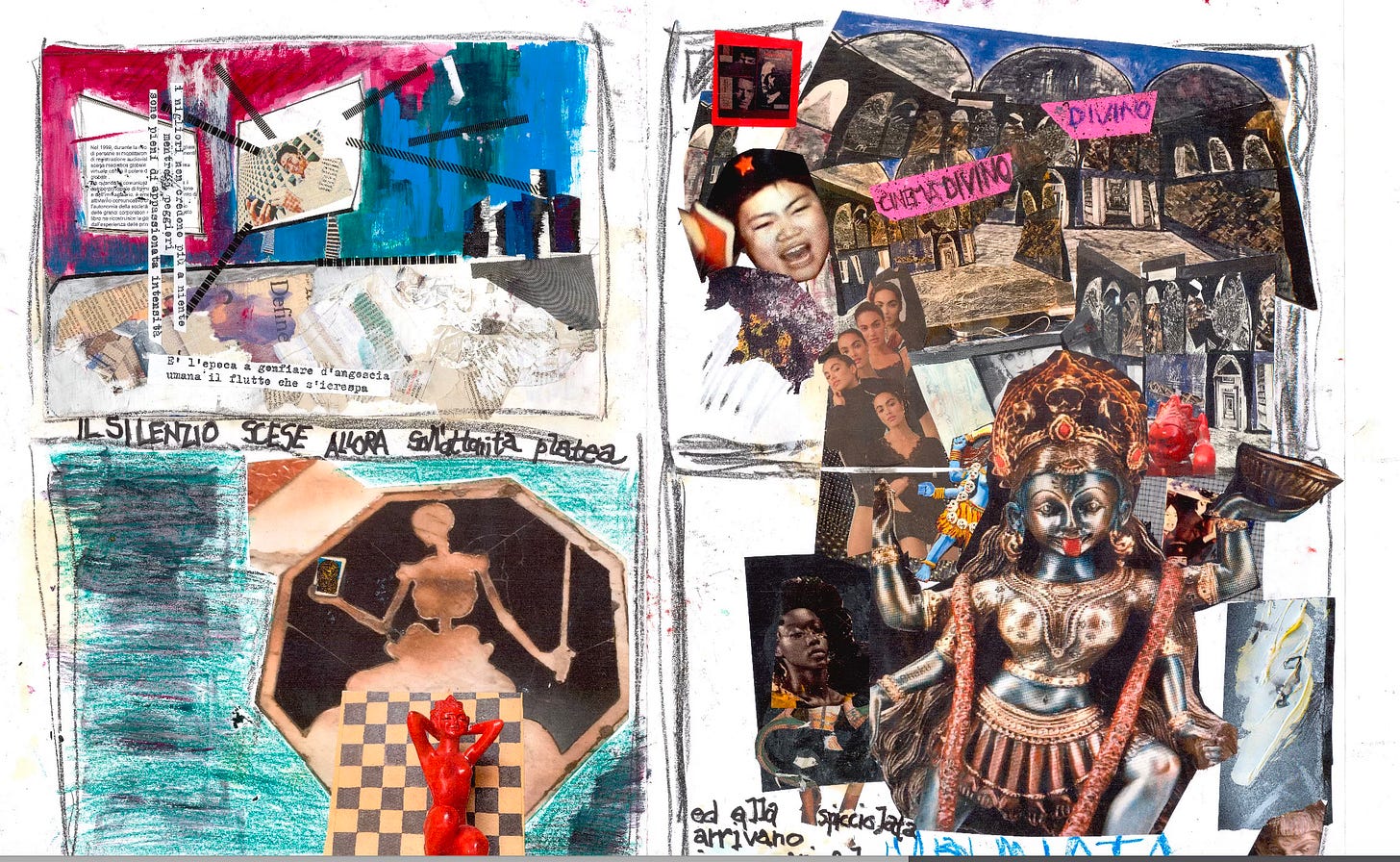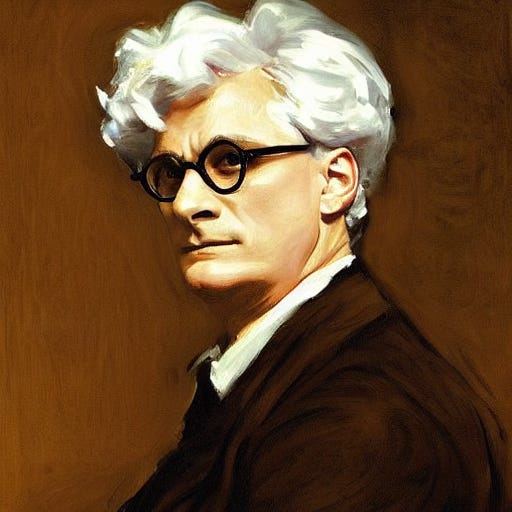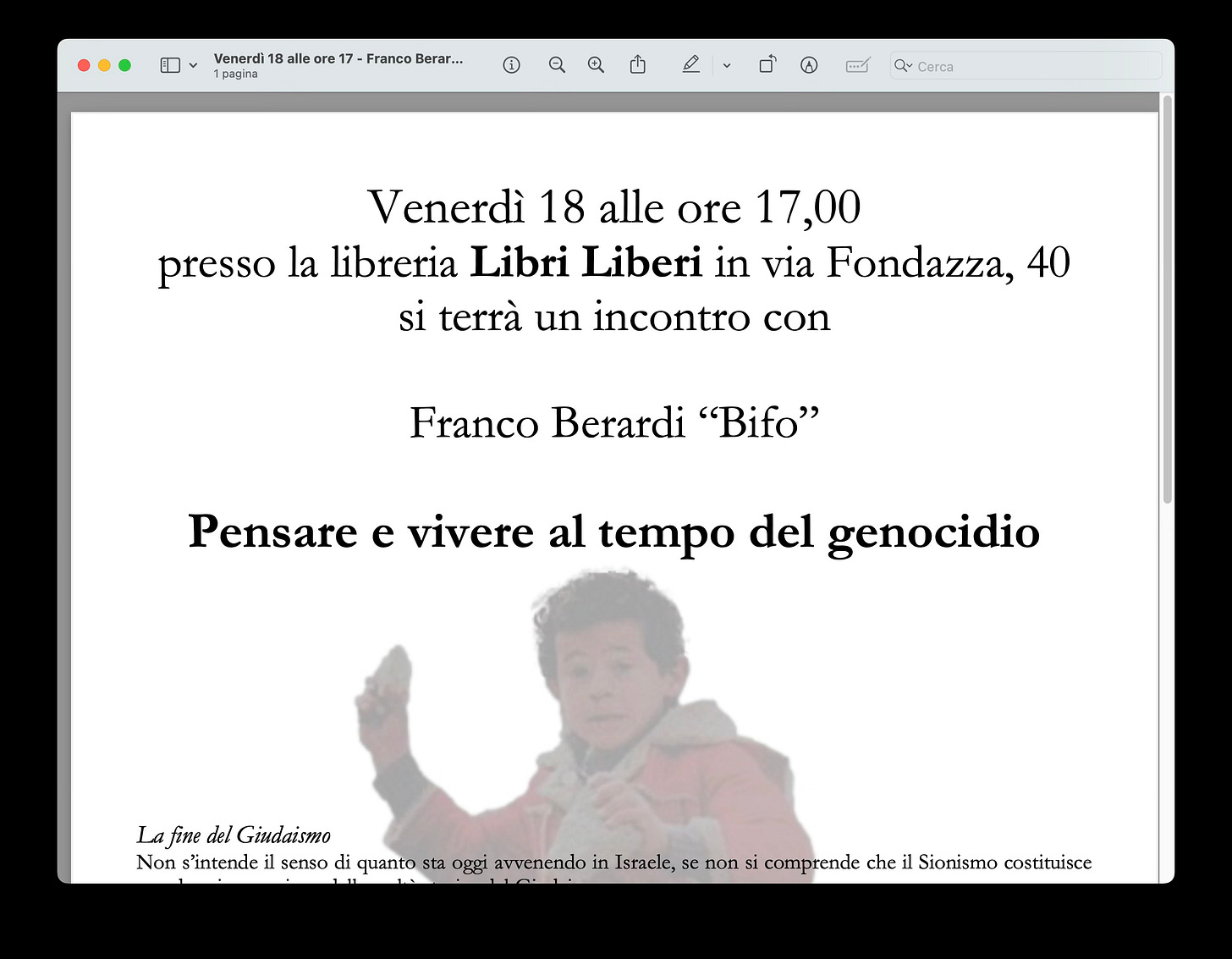What am I doing? Che sto facendo?
Dopo avere visto Joker2 mi sono chiesto: è giusto dire la verità, quando la verità è così orribile che potrebbe dissuadere dal tentar di vivere? ITALIAN VERSION BELOW
Istubalz 2019: La convulsione
_______________________________________
JOKER/2
Walking towards the movie theatre where Joker 2 was being shown, I whispered to Billi: "I'm afraid we'll be disappointed by this sequel."
Remember the Joker from 2019?
It was the autumn of the convulsion that preceded the pandemic psycho-deflation: as cities all over the world (from Santiago de Chile to Hong Kong, from Tehran to Quito) were exploding in a convulsive insurrection, without a common strategy, Joker appeared to me as the symbol of rampant mental suffering, of social depression, and of the spreading desire to explode.
In the demented laughter of Arthur Fleck, and in the willowy dance of Joaquin Phoenix I could discern Reaganism and Trumpism, liberalism and Nazism, psychotic madness and the cult of competitive individualism, acceleration of the Infosphere.
Watching a trailer of the sequel I told myself: that dystopian spell, that painful injection of truth cannot continue in the new episode.
I was afraid that it would disappoint me with a Hollywood happy ending.
I was wrong.
I left the cinema convinced that Todd Philipps is prince of the contemporary imagination, interpreter of the dark ZeitGeist that dominates the era in which we live: an era of genocide, when Auschwitz is a spectacle that we are daily invited to witness by the torturers of Israel.
Lady Gaga's voice hurts like a splinter of pure crystal. Phoenix's dance is the painful and deformed elegance of the body tormented by metropolitan violence.
There is no longer any hope except in entertainment, Lady Gaga says. Only in fiction can we fall in love, only in fiction can we live.
In fact, Arthur Fleck and Harley Quinn are happy in love in the imaginary scenes of the musical.
In reality they are prisoners, chronically depressed people stuffed with mandatory psychotropic drugs.
When Joker declares at the trial that Joker does not exist, that he is Arthur Fleck and his life is forever torn apart by memory and being, his sweetheart leaves, as she no longer loves him.
Only in the fiction of entertainment could we be happy, she tells him. I loved Joker, I can't love Arthur Fleck.
This Joker 2 ends very painfully, anything but a Hollywood happy ending. It is a realistic film about the unreality of life, or rather the impossibility of life in this reality.
It's a film about irony, but it's an irony so sad, so desperate that I wonder if it's right, if it's legitimate to continue telling the truth when the truth is so horrible that it could dissuade you from trying to live.
WHAT AM I DOING?
At that point I found myself thinking about myself, about what I'm doing.
What is it for?
For seven or eight months I have been editing this blog which reaches a few thousand readers. But what's the point?
The first answer that comes to mind, and the most sincere: I write this blog to cure my anguish, my sense of dismay and impotence in the face of the precipice that is swallowing up every form of life and language.
The repetition of the horror of Auschwitz, this time seen worldwide, hurts me as it hurts anyone who has not become totally insensitive to the pain of the world.
But I asked myself: couldn't I treat my anguish privately, in silence, perhaps by taking a few pills, without publicly showing my pain and dismay?
Don't I perhaps run the risk of harming those who read me, especially young readers, who should be encouraged not to be overcome by desperation and to continue the fight?
I reflected on these questions, and gave myself some answers.
What am I doing?
I'm trying to draw a map of the abyss we are forced to explore.
Knowing where we are is better than not knowing, and drawing a map of the abyss is useful for those who have to live in the abyss, it is a necessary condition for living the abyss as happily as possible.
I'm trying to map the territory of the inevitable so that someone knows how to hide in the ravines of the unpredictable.
The Nazi-liberal offensive that was unleashed since 11 September 1973 by Pinochet and Kissinger has cancelled democracy and saddened life for everyone.
Since workers' internationalism was defeated, war has returned to every niche. The war that is raging and expanding is a colonialist and genocidal war, of which Gaza is the symbol and the center.
While the social organism is in a condition of impotence, reduced to passivity and depression, the West is in the grip of senile marasma, but possesses techno-military potency that can eradicate life on the planet.
The history of the past century shows that fascism and war may act as a cure for depression. Aggression acts on the depressed organism like amphetamine. But it is a suicidal cure.
Amphetamine allows the depressed organism to be euphoric for a few hours in the evening, but at five in the morning you jump off the window.
This suicidal cure occurs again today, on a much larger scale: nationalism is the name of this suicidal cure, and war mobilizes depressed energies and hurls them into a destructive vortex.
What psycho-political strategy can lead us out of this black hole?
The strongest current in the contemporary psychosphere is depressive passivity. Perhaps the condition for an autonomous subjectivity to emerge lies precisely in consciously and collectively assuming the depressive symptom. Prescribing the symptom is sometimes an effective treatment for psychological pain.
In the collective unconscious there is a tendency to disinvest all energies, and to withdraw from the social game itself.
This disinvestment, this desire to abandon, this passivity - can become an immense force if it becomes conscious and systematic.
When national murderers call for defense of the homeland many think: I don't want to die nor do I want to kill to obey these pigs.
Deserting is not easy, but deserting is necessary.
In the social conditions of contemporary Nazi-liberalism every sphere of social life is a sphere of war: competition is war, and competition is everywhere.
Therefore we must desert everywhere.
XXXXXXXXXXXXXXXXXXXXXXXXXX
Istubalz
che sto facendo
__________________________________
“Sinistro rumor di silenzio” (Clemente Rebora)
Joker2
Camminando verso il cinema Medica dove si proiettava Joker 2, ho sussurrato a billi che mi accompagnava: “temo che usciremo delusi da questo sequel.”
Ricordate il Joker del 2019?
Era l’autunno della convulsione che precedette la psico-deflazione pandemica: le città di mezzo mondo (da Santiago de Chile a Hong Kong, da Teheran a Quito) esplodevano in un’insurrezione convulsiva, priva di comune strategia, e Joker mi apparve allora come il simbolo della sofferenza psichica dilagante, della depressione sociale, e del desiderio di esplodere che si stava diffondendo.
Reaganismo e trumpismo, liberismo e nazismo, follia psicotica e culto dell’individualismo competitivo, accelerazione del ritmo dell’Infosfera: c’era tutto questo nella risata demente di Arthur Fleck, e nella danza flessuosa di Joaquin Phoenix.
Non pensavo che nel nuovo episodio potesse continuare quell’incantesimo distopico, quella iniezione di verità dolorosa.
Del sequel avevo visto un trailer, e temevo che mi avrebbe deluso con un happy end hollywoodiano.
Sbagliavo.
Sono uscito dal cinema convinto che Todd Philipps è principe dell’immaginario contemporaneo, interprete dell’oscuro ZeitGeist che sovrasta l’epoca in cui viviamo: epoca del genocidio in cui Auschwitz è spettacolo cui siamo quotidianamente invitati ad assistere dai torturatori israeliani.
La voce di Lady Gaga ferisce come una scheggia di puro cristallo. La danza di Phoenix eleganza dolorosa e deforme del corpo tormentato dalla spietatezza metropolitana.
Non c’è più alcuna speranza se non nell’entertainment, dice lei. Solo nella finzione possiamo innamorarci, solo nella finzione possiamo vivere.
Infatti Arthur Fleck e Harley Quinn sono innamorati felici nelle scene immaginarie del musical.
Nella realtà sono prigionieri, depressi cronici imbottiti di psicofarmaci obbligatori.
Quando Joker dichiara al processo che Joker non esiste, che lui è Arthur Fleck e la sua vita è per sempre lacerata dalla memoria e dall’essere, la sua innamorata se ne va, non lo ama più.
Solo nella finzione dell’entertainment potevamo essere felici, gli dice. Amavo Joker, non posso amare Arthur Fleck.
Finisce molto dolorosamente questo Joker 2, altro che happy end hollywoodiano. E’ un film realistico sull’irrealtà della vita, o piuttosto sulla impossibilità di vita nella realtà.
E’ un film sull’ironia, ma è un’ironia così triste, così disperata che mi chiedo se sia giusto, se sia legittimo continuare a dire la verità quando la verità è così orribile che potrebbe dissuadere dal tentar di vivere.
Immagine elaborata da Max Geraci
_______________________________________________
che sto facendo?
Che senso ha?
Ecco allora che mi sono ritrovato a pensare a me stesso, a quel che sto facendo.
A cosa serve?
Da sette otto mesi curo questo blog che raggiunge qualche sparuto migliaio di lettrici e di lettori. Ma che senso ha?
La prima risposta che mi viene in mente, è la più sincera: scrivo questo blog per curare la mia angoscia, il mio senso di sbigottimento e di impotenza di fronte al precipizio che sta inghiottendo ogni forma di vita e di linguaggio.
Il ripetersi dell’orrore di Auschwitz, questa volta in mondovisione, mi fa male come fa male a chiunque non sia diventato totalmente insensibile al dolore del mondo.
Però mi sono chiesto: non potrei curare la mia angoscia privatamente, in silenzio, magari prendendo qualche pillola, senza esibizione pubblica del dolore e dello sgomento?
Non corro forse il pericolo di fare del male a chi mi legge, soprattutto ai lettori giovani, che dovrebbero essere incitati a non farsi vincere dalla disperazione?
Ho riflettuto su queste domande, e mi sono dato delle risposte.
Cosa sto facendo?
Sto cercando di disegnare una mappa dell’abisso che siamo costretti a esplorare.
Sapere dove ci troviamo è meglio che non saperlo, e disegnare una mappa dell’abisso può essere utile a chi deve abitare l’abisso, ed è condizione necessaria per vivere l’abisso felicemente per quanto possibile.
Sto cercando di cartografare il territorio dell’inevitabile perché qualcuno possa nascondersi negli anfratti dell’imprevedibile.
Da quando l’11 settembre 1973 il generale Pinochet uccise la democrazia cilena per compiacere i suoi padroni liberisti yankee la democrazia è diventata una finzione e la vita è più triste per tutti.
Da quando è stato sconfitto l’internazionalismo operaio, la guerra è tornata in ogni nicchia.
La guerra che divampa in molti luoghi del mondo è prima di tutto una guerra colonialista e genocida, e Gaza ne è il simbolo e il centro.
Mentre l’organismo sociale è in condizione di impotenza, ridotto alla passività e alla depressione, l’occidente è in preda al marasma senile, eppure possiede la potenza che può cancellare la vita sul pianeta.
La storia del secolo passato mostra che il fascismo e la guerra possono funzionare come una cura per la depressione. L’aggressività agisce sull’organismo depresso come anfetamina. Ma è una cura suicida.
L’anfetamina permette all’organismo depresso di passare una serata euforica, ma alle cinque di mattina si butta giù dal decimo piano.
Questa cura suicida si ripresenta oggi, su una scala molto più ampia.
La guerra mobilita le energie depresse e le scaglia in un vortice distruttivo.
Quale strategia psico-politica può condurci fuori da questo buco nero?
La corrente più forte nella psicosfera contemporanea è la passività depressiva. Forse la condizione perché emerga una soggettività autonoma sta proprio nell’assumere consapevolmente e collettivamente il sintomo depressivo. Prescrivere il sintomo è talvolta una cura efficace.
Nell’inconscio collettivo c’è una tendenza al disinvestimento di ogni energia, al ritirarsi dallo stesso gioco sociale. Questo disinvestimento, questo desiderio di abbandono, questa passività - possono divenire una forza immensa se vissuti in maniera cosciente e sistematica.
Quando gli assassini chiamano alla difesa della patria molti pensano: non voglio morire né voglio uccidere per obbedire a costoro.
Disertare non è facile, ma occorre disertare.
Nelle condizioni sociali del Nazi-liberismo contemporaneo ogni sfera della vita sociale è una sfera di guerra: la competizione è guerra, e la competizione è dappertutto.
Dunque occorre disertare dappertutto.
_______________________________________________________
LIBRI LIBERI Via Fondazza, 40, BOLOGNA







